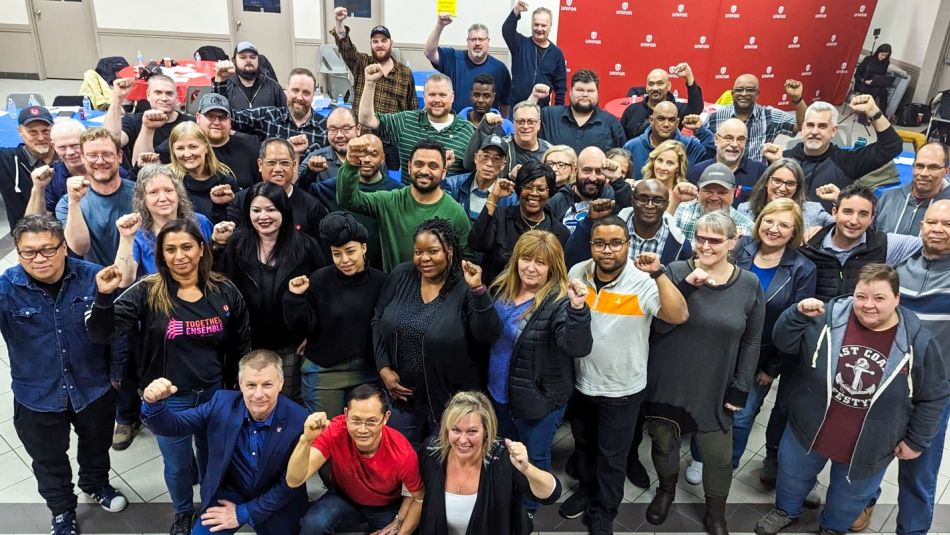
During the 2022 Constitutional Convention Unifor delegates overwhelmingly endorsed the union’s Action Plan--an ambitious three-year program to build worker power through strategic action and solidarity.
The Action Plan includes a commitment to update the union’s national bargaining program, informed by the ideas and experiences of members.


Message from the Working Group Chairs
Collective bargaining is essential to our union. This is why we've undertaken to update our National Collective Bargaining Program guided by the ideas and input of our members – a mandate from our 2022 Constitutional Convention and part of Unifor's three-year Action Plan.
Between February and June of this year, Unifor's national leadership and staff met directly with more than 1,700 local union leaders, workplace representatives and activists to talk about collective bargaining.
Over four months, the union held 45 individual Regional Strategy Sessions across the country, including two virtual sessions. These sessions provided space for members to talk openly about their bargaining experiences, strategies, and priorities. The sessions brought together local union representatives in the hopes of sharing their struggles and strengthening their bonds of solidarity. These sessions also allowed members to consider Canada's current economic and political challenges, and how our union must respond.
As we continue to review our members' input from the Regional Strategy Sessions, we are providing this summary report to identify the key themes that will guide the development of the new National Collective Bargaining Program. This Program will be presented, in its full form, to a special Bargaining Workers' Power Summit held on August 17, in conjunction with Unifor's 2023 Canadian Council.
What was made abundantly clear throughout this process is how vital collective bargaining is to win stronger, better paid and more secure jobs for every worker. By negotiating the conditions of work, including wages, scheduling, health and safety, retirement provisions, job security, sickness, health benefits, and so many others, workers participate in the strongest expression of industrial and participatory democracy we have.
Done strategically and with intention, collective bargaining can be a transformative exercise that engages and inspires union members, influences public policy, and grows solidarity among all workers in Canada and abroad.
We are grateful to the members who participated in this process. We hope you see your ideas and views reflected in this summary report.
In solidarity,
Shane Wark
Assistant to the National Officers Executive
Olivier Carriere
Assistant to the Quebec Director

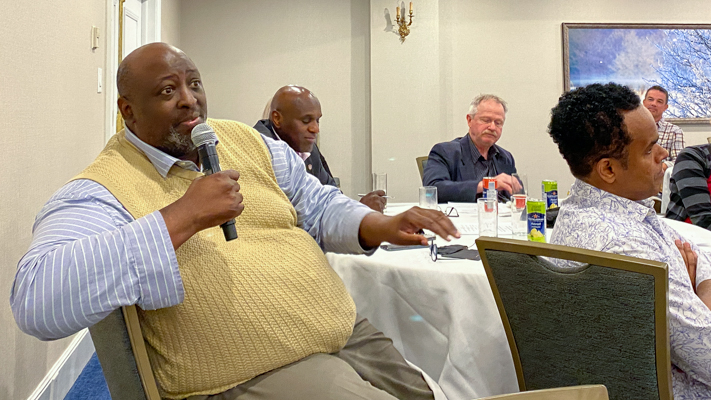
Co-Chairs
Olivier Carrière, Executive Assistant to the Quebec Director
Shane Wark, Assistant to the National Officers
National President’s Office
Roxanne Dubois, Executive Assistant to the National President
Regional Directors
Gavin McGarrigle, Western Region Director
Jennifer Murray, Atlantic Region Director
Naureen Rizvi, Ontario Region Director
Regional Council Chairs
Shinade Allder, Ontario Council
Sophie Albert, Quebec Council
Matt Blois, Atlantic Council
Guy Desforges, Prairie Council
Leanne Marsh, British Columbia Council
National Executive Board
Dereck Berry, Black, Indigenous, Workers of Colour
John D’Agnolo, Auto Sector
Dana Dunphy, Hospitality and Gaming Sector
Chris Garrod, Rail Sector
Yves Guérette, Forestry Sector
Julie Kotsis, Media Sector
Tammy Moore, Aviation Sector
Staff
John Breslin, Director, Skilled Trades
Josh Coles, Director, Member Mobilization and Political Action
Graham Cox, Research Department
Anthony Dale, Senior Director, Legal Department and Constitutional Affairs
Angelo DiCaro, Director, Research Department
Robin Fairchild, Director, Education Department
Erin Harrison, Research Department
Marc Hollin, Research Department
Sandeep Kakan, Director, Pensions and Benefits Department
Simon Lavigne, Research Department
Niki Lundquist, Senior Director, Equity and Education
Karen Marchesky, Research Department
Sarah McCue, Communications Department
Kathleen O’Keefe, Director, Communications Department
Tracey Ramsey, Director, Women’s Department
Sune Sandbeck, Research Department
Vinay Sharma, Director, Health, Safety & Environment Department
Kaylie Tiessen, Research Department

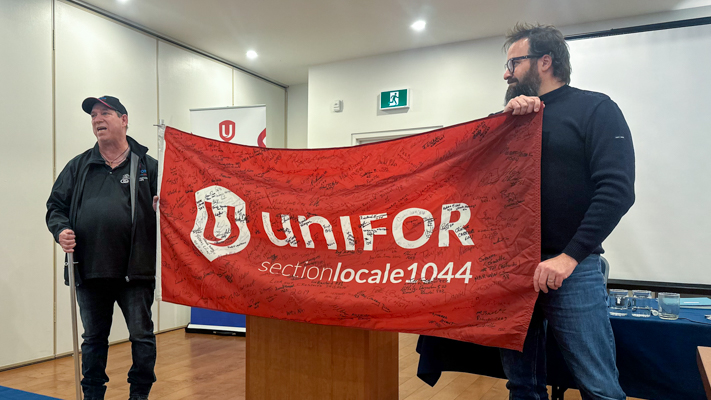
What We've Done
Timeline: August 2022-June 2023
Unifor's Constitutional Convention Delivers Mandate
In August of 2022, delegates to the Unifor Constitutional Convention endorsed the union's 2022-2025 Action Plan. Among the commitments outlined in the plan is for the National Union to update its National Bargaining Program, and to ensure the Program is “informed through a cross-country engagement of Unifor local union leadership, bargaining committee representatives, activists and staff.”
Working Group Launched
In December of 2022, Unifor's National leadership invited various elected officers, National Executive Board members, and senior staff to participate in a Working Group that would oversee the National Bargaining Program update and local union engagement tour – under the project title: Bargaining Workers' Power.
The Working Group was asked to provide input and guidance on the following items:
-
Organizing a cross-country engagement effort that is as inclusive and responsive as possible for Unifor members,
-
Ensuring that regional meetings are well-attended, and the programming yields meaningful dialogue and input,
-
Identifying key themes from regional meeting reports to help guide the design of the new bargaining program,
-
Reviewing and commenting on drafts of materials, as well as the bargaining program itself, and
-
Developing the agenda of a National Bargaining Summit.
Materials Developed
Over the course of January and February of 2023, a Bargaining Workers' Power “discussion-starter” presentation was prepared by the Research and Education Departments, along with a set of three discussion questions. The presentation and questions were piloted at a special meeting of Unifor's Northern Ontario local union leadership as well as a series of local union events as part of the Unifor Quebec Director's Tour. Feedback from these pilot sessions informed Working Group final decisions on developing the structure of the Regional Strategy Sessions.
Regional Strategy Sessions Promoted
Working Group members also developed a list of targeted communities, dates, and venues for the Regional Strategy Sessions. Registration was facilitated through a dedicated Unifor webpage prepared by the Communications Department.
Outreach materials were sent from the National President's office to staff and local union leadership. Additional outreach to locals was made through the offices of the Regional Directors, as well as direct communication to locals by the appropriate Area Director.
Cross-Canada Regional Strategy Sessions Held
Between February and June of 2023, a series of 45 Regional Strategy Sessions were held in communities across the country with a high concentration of Unifor members. Two additional sessions were held virtually, including a special session involving members of Unifor's Equity Standing Committees.
Information and Member Input Gathered from Regional Sessions
During the Regional Strategy Sessions, Unifor researchers (or designates) took detailed notes of comments and issues raised by members. These notes were grouped together and analyzed with the help of a customized computer program developed in house.
The program helped identify issues and topics mentioned by members across the multiple strategy sessions, produced a list of the most talked about issues, and grouped members' comments by those issues.
Summaries of each issue were then produced by the researchers.
In addition to the program, the raw notes were reviewed by the researchers to extract other interesting and/or noteworthy issues, topics, and quotes by members.
The goal was to produce a document that effectively captured and presents what we heard from members during the strategy sessions.
The summaries of members' discussion points along with a collection of additional top-line issues are presented below. They are presented here as narratives, topic lists, and pie-charts.
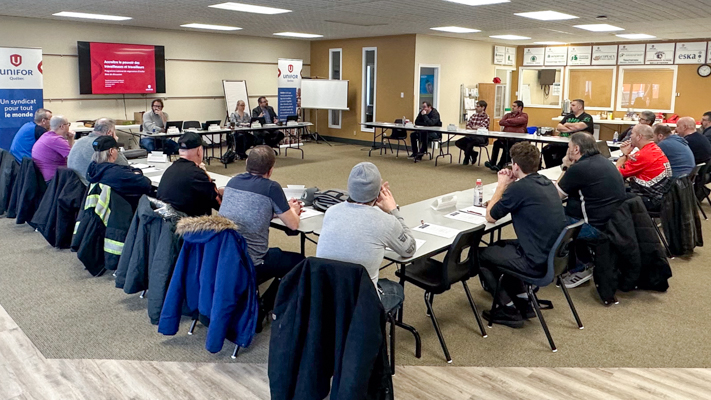
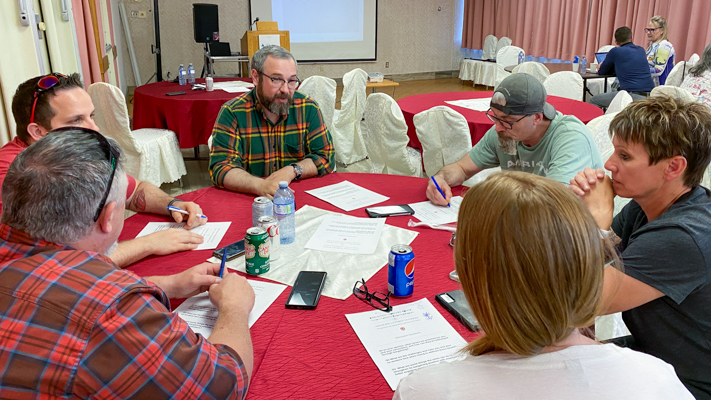
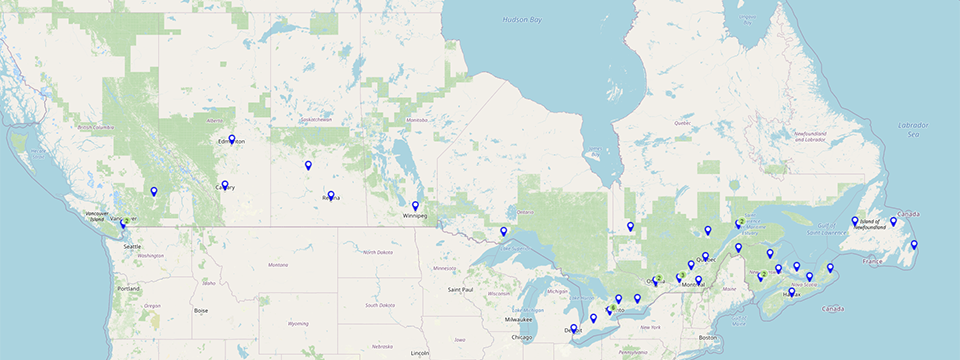
Atlantic
March 22 Saint John, NB
March 23 Fredericton, NB
March 27 Edmundston, NB
March 28 Miramichi, NB
March 29 Moncton, NB
April 17 Sydney, NS
April 18 Antigonish, NS
April 19 Halifax, NS
May 8 Charlottetown, PEI
May 16 St. John's, NL
May 17 Gander, NL
May 18 Corner Brook, NL
Quebec
February 10 Montreal
February 13 Amos
February 14 Saguenay
February 15 Baie-Comeau
February 16 Rimouski
March 13 Trois-Rivieres
March 14 Quebec
March 21 Ste-Therese
April 17 Gatineau
May 16 Sherbrooke
June 27 Longueuil
Ontario
February 23 Thunder Bay
April 3 Windsor
April 4 Kitchener-Waterloo
April 5 Toronto
April 6 Peel
April 19 Niagara-St. Catharines
April 20 Hamilton
April 24 Halton
May 10 London
May 15 Ottawa
May 29 Durham
May 30 Belleville
West
Apr 13 New Westminster, BC
May 8 Victoria, BC
May 16 Edmonton, AB
May 17 Saskatoon, SK
May 18 Regina, SK
May 23 Kamloops, BC
May 24 Winnipeg, MB
May 25 Calgary, AB
Additional
June 5 Virtual Session (National)
June 6 Virtual Session (Equity)


What We Heard: Consolidated themes
Discussion held at each of the 45 Regional Strategy Sessions provided unique insights into the workplace challenges members face, as well their priorities. Despite notable differences in the economic circumstances facing workplaces or industries, many common ideas and experiences emerged.
These ideas and experiences were consolidated and categorized into nine themes, as noted, and further explained below.
1. Wages and Income Security
We have lost control, we need to regain our footing on inflation.
(Montréal, February 10)
The increasing cost of living was outlined as a major issue by members in all sessions. Working class families are struggling to make ends meet in the face of price increases and concerns about a potential economic slowdown. The response from members was to look at linking unexpected cost of living increases to automatic wage adjustments in the collective agreement, along with other wage and income security improvements such as enhanced pay premiums, income top-ups and layoff assistance, equal pay for work of equal value provisions, severance pay, among others.
A full list of Wage and Income Security issues raised are summarized here:
-
Members had broad discussion about wages not keeping up with needs, and rising consumer prices.
-
When company profits are high, employers still claim they have no money for wage increases.
-
The elimination of wage tiers was universally supported, recognized as causing a generational divide in the membership and hurting the union.
-
Concern was raised over disparities in casual, temporary, and other non-standard classification wage rates that are too low. Instead, these rates should be in-line with full-time workers doing the same work.
-
An increase in work hours or speed-up was seen as a way for the employer to erode wage gains.
-
There were multiple calls for more pattern bargaining or sector-based bargaining to establish a standard compensation rate between employers.
-
Mature contracts facing concessions if members do not demand/fight for changes.
-
Employers are changing work under classifications but not updating wage rates to reflect the increased skill necessary to do that work.
-
Automatic escalators for lower wage rates if there are minimum wage increases.
-
Retail workers feel that many of them do not make enough to shop at the store they work in.
-
Forced overtime was identified as a problem across multiple sectors.
-
Information of prevailing/comparison wage rates and cost of living provided before bargaining.
-
There was a recommendation that Unifor should seek to eliminate "Temporary Part Time" positions language in contracts.
-
There was broad support for COLA/indexing language to be re-introduced or re-activated in collective agreements. There were also many questions about COLA and if adjustments can be included for retirees.
-
Pay raises to match inflation and price increases was seen as necessary to maintain standard of living. There were several comments suggesting that real price increases faced by members should be monitored, not just average CPI measures.
-
Increased recognition of worker versatility (ability to operate different types of machinery and/or processes) through higher wages or pay premiums.
-
Calls to review and improve pay premiums (amounts have not followed recent inflation rates) or create new ones for certain sectors that rely on seasonal or remote work.
2. Health and Safety
Health and safety issues are always raised with management, and it feels like they are always neglected. We need management to make this a priority.
(Winnipeg, May 24)
Many workers are experiencing the effects of the mental health and addiction crisis in Canada, with mental health surfacing as a priority issue in many Regional Strategy Sessions. Unifor members see great value in the union's health and safety work and stressed the need for strengthening health and safety committees. To make work safer the focus for collective agreement language was for stopping working alone, emergency preparedness plans, better sickness and accident response, among others. Members also called for support dealing with employers attempting to achieve productivity increases through speed-up.
A full list of Health and Safety issues raised are summarized here:
-
There was a common call for re-invigorated health and safety committees and for members to be more active/empowered within the committees.
-
Broad support for negotiating metal health awareness days.
-
A recommendation was to support bargaining a Mental Health Advocate (similar to Unifor's Women's Advocate and Racial Justice Advocate programs).
-
Mental health should be included as part of the job risk assessment (the 13 factors).
-
Mental health supports should be included in all benefits programs.
-
Working alone identified as a major safety issue.
-
Productivity increases (speed-up) was closely connected with negative mental health outcomes and occupational hazards. The employers' search for productivity gains have led to the strict monitoring of time-based production and the speeding-up of work processes.
-
Members recognized the need to address productivity issues in a more comprehensive manner through adequate worker input that builds upon notions of quality, sense of accomplishment and enjoyment at work.
3. Benefits
It’s critical that conversations are had among workers, across generations, to talk about the history – the evolution of our work standards – what we fought to maintain, and what employers tried to take away. History and learning builds solidarity.
Durham, May 29)
The cost of benefit plans and the need to expand access to benefits was raised in all sessions. Benefits plans are not keeping-up with the increased costs of disability, medications, and additional health services. Benefits are seen as necessary for recruitment and retention of younger workers including expanding access to parental and personal leaves, paid holidays, and expansion of inclusive medical benefits such as gender affirming care.
A full list of Benefits issues raised are summarized here:
-
Common concern that the costs of benefits are increasing faster than coverage. This was especially the case for Long-Term Disability where costs are very expensive and continue to grow too fast.
-
Tiered access to benefits were highlighted as a concern.
-
There were requests to find ways for those on casual and part-time hours to also access benefits and finding ways to expand plans to include post-retirement benefits.
-
There were requests that gender affirming surgery language be incorporated into collective agreements and benefits plans.
-
Orientation education for new workers on benefits would expand the power to defend benefits plans.
-
Requests to increase the number of paid holidays and various types of paid or unpaid leave days (floating, personal, family obligations, sickness, deferred salary leave, childbirth, etc.)
4. Pensions and Retirement Security
“Taking care of retirees feels a bit like ‘yesterday’s’ issue, which is disheartening. Protecting our retirees is one of the most important things our union can do.”
(Victoria, May 8)
Members are looking to the union to support the expansion of retirement security through pensions for all members. Non-universal and/or tiered access to pensions was seen as a threat to union security and important in recruitment and retention of new and younger workers.
A full list of Pensions and Retirement issues raised are summarized here:
-
Lack of a pension plan was identified as a big issue for members, especially retaining new and younger members.
-
There is a labour shortage in many classifications that are not covered by quality retirement security language. This may open an opportunity to push for the start of employer pension plans.
-
Common recognition that a growing Canadian labour force is needed to fund current pension system.
-
Much interest in moving from Defined Contribution pension to Defined Benefit-style plans. Members lamented the erosion of DB plans, suggesting it has resulted in too many tiers of pension access.
-
Suggestion to remove cap on number of pension contribution years or increase retirement income through pension plan.
-
Many pension funds reported as not fully funded, and this concerns members.
-
Explore the establishment of a Unifor multi-employer pension plan.
-
Make early or progressive retirement options more accessible and ensure flexible use to retain qualified and experienced workers and promote mentoring and skills transfer to new workers.
5. Human Rights, Inclusion, and Workplace Equity
In my workplace (transportation industry), ninety percent of the workers are men. Our employer tells us that these jobs ‘just aren’t fit for women.’ It’s astonishing that the employer can’t see that women can do these jobs.
(Virtual Session, Equity Committees, June 6)
Building an inclusive workplace where all workers can work and thrive continues to be a struggle for many Unifor members. Discrimination by employers was identified as the primary obstacle to recruitment of a more representative workforce. Advocate positions being negotiated into collective agreements and increasing diversity on bargaining committees was seen as the best ways to keep inclusion front and centre in the workplace.
A full list of Human Rights, Inclusion and Workplace Equity issues raised are summarized here:
A full list of Human Rights, Inclusion and Workplace Equity issues raised are summarized here:
-
Pay equity continues to be a challenge for workers in many workplaces.
-
Support for bargaining Indigenous reporters in the media sector.
-
Bargaining advocate positions identified as a good model to expand support for workers from equity seeking communities.
-
Male dominated workplaces were identified as needing direct supports for women in combating discrimination. The skilled trades were specifically named as an area where union diversity needs to be expanded.
-
Buyouts instead of layoffs. Layoffs decimate workers from equity seeking communities and it undoes years of progressive hiring.
-
Mental health plays a role in equity hiring.
-
Remove obstacles for women to enter male-dominated workplaces, including better parental leave and protective reassignment language during time off.
-
Targeted measures are need for recruitment of women in male dominated workplaces.
-
Pay equity and equal pay provisions need stronger enforcement.
-
Collecting data on demographics in the workplace would help identify disparities.
-
Employers are the major obstacle in many male dominated fields.
-
Many highlighted that collective agreement language and not just legislation was needed to enforce equity and anti-discrimination, gender neutral language.
-
Support to get equity audits in workplaces was recommended.
-
Bathroom access continues to be an equity issue across sectors and regions.
-
An Equity Lens is necessary to do analysis before bargaining for improving access to benefits and pensions.
-
Many issues with bargaining more inclusive language could be solved with support for more inclusive bargaining teams.
-
A recommendation was to support anti-oppression training for locals and employers.
-
Welcoming and supporting new Canadians and especially migrant workers in the workplace requires the bargaining of a comprehensive union-led framework with adequate resources (including union leave time, training, interpretation, etc.).
-
In Quebec, there is a need to bargain better access to francization programs and resources in the workplace, with paid leaves to complete coursework.
-
Adapting unpaid leaves or holiday period provisions in collective agreement to better reflect the needs of workers with extended families living abroad (ex. travel required after a death in the family).
6. New Technology, Climate Change, and the Future of Work
We need guarantees from the companies that we are part of their transition plans, and that we are attached to the potential new jobs that will be created.
(Edmonton, May 16)
The changing nature of work in all workplaces was raised as a source of anxiety for members. Negotiating and enforcing strong technological change and skills development language will be essential to ensuring the future of work will be pro-worker, whether because those changes are caused by climate change or the implementation of new technologies. The union must push employers to be proactive in their training and investment programs.
A full list of New Technology, Climate Change, and the Future of Work issues raised are summarized here:
-
New technologies are impacting work in all workplaces.
-
Employer time expectations are increasing. When workers must prepare for work outside of work hours, they never switch off, and can be disciplined if not prepared. Recommendations that workers be given more paid time to prepare, within work hours.
-
There are situations where workers are transferred in before there is major training of employees on new technology.
-
The fear of job losses from implementation of new technology is real and members say they see it happening.
-
Employers are not proactive when it comes to (re)training current workers on new technology and just wait until after a decision is made to implement it.
-
Freight jobs and sorting jobs are being automated, and those jobs are being lost.
-
Job classifications need to be updated to reflect skills related to new technologies.
-
New machines are used to replace workers and get around collective agreement gains such as contracting-out language.
-
There is fear that if the union increases demands at the table then their jobs will be lost to automation and/or contracting-out.
-
Companies are not being transparent about their plans for tech change and so little ability to respond to it.
-
Introduction of new technologies, equipment or processes must take worker input into account and requires the active participation of the union to ensure adequate integration.
-
Members see employers using new technology implementation in a strategic/coordinated way, to slowly erode past collective agreement gains.
-
Additional training time and resources must be bargained to enable workers to face adaptation and qualification challenges posed by the introduction of new technologies.
-
In certain sectors with small employers that do not have critical mass to adequately respond to retraining needs (ex. dealerships, auto services), unions should demand and bargain for coordinated, sectoral, mandatory oversight.
-
Members supported the idea of bargaining joint union-employer environment committees that create a binding discussion space to engage on climate related transition issues (e.g. decarbonization, net-zero pathways) and the investments needed to achieve outcomes.
-
New technology training and education support from union and/or supportive collective agreement language.
7. Workforce Attraction and Retention
“Limited housing supply, lack of access to services, the attraction retention challenge is more intense in remote communities.”
(Baie-Comeau, February 15)
The new generation of workers are demanding more work-life balance, options for working from home, stable scheduling and hours of work, and access to full-time jobs. These issues are now central to recruitment and retention in any workplace.
A full list of Workforce Attraction and Retention issues raised are summarized here:
-
Different priorities of generations should be reflected in the collective agreement and work of the union. Work-life balance is seen as a major issue for new/younger workers. Holidays allocation and inflexible shift schedules are identified by young workers as major friction points and often trigger job movement.
-
There is a sense of the employer giving up their responsibility when it comes to recruitment. New openings require the employer to make the job seem more appealing to younger workers, not just assume the new workers will be the same as the older workers.
-
Increased competition between firms for skilled workers means workers can move if they are not satisfied with the work. Wages are too low, but employers are not seeing this as the problem.
-
Some business models are built on high turnover. Collective agreements should seek to slow down this turnover and push back on this model. Higher turnover of employees is causing strain on workers who remain and reduce quality of the work environment.
-
Retention of management is also an issue. With high turnover of management there is a constant loss of understanding how the work happens.
-
Attraction-retention issues are worse in remote/rural locations due to additional challenges (distance, lack of infrastructure/social services, housing, etc.)
-
Accessible and flexible early or gradual retirement clauses that focus on mentoring and knowledge transfer can help mitigate worker retention and work-life balance issues.
-
In specific regions and industrial clusters (ex. “Battery valley” in Québec) that will face high growth over the next years, bargaining strategies must factor in increased competition in the job market.
-
Need to bargain provisions that facilitate long term planning, training, and development pathways for the workers in a company.
8. Job Security and Precarious Work
I have to care for my kids, and occasionally I get sick and need to take care of myself. Why am I made to feel like a criminal by my employer for being a human being?
Halifax, April 19)
Employers have attempted to bypass existing regulations, worker rights, and collective agreements by using technology-supported contracting-out. Increases in precarious work and undermining existing job security is not just bad for new workers, but also undermines the stability of pension funds, union solidarity, and knowledge transfer between retiring and new workers. Members highlighted the need for stronger enforcement of job security language.
A full list of Job Security and Precarious Work issues raised are summarized here:
-
Job security is a major issue across the country and across sectors.
-
The response to job security issues is also similar across the union. Employers need to invest more in sustainable production/services. Unions need to organize casuals and part-time workers and bargain increases to casual wages.
-
A process was requested to broadly interpret (or bargain expanded) contract “scope” clauses for dealing with relocation or changes in/new investment.
-
Increase in precarious work is also seen as a threat to pensions, benefits, and solidarity within the workplace and local union.
-
Contracting-out, contract flipping, and outsourcing are seen to have similar incentives for employers – cutting costs and eroding bargaining unit power. The solutions to these issues range from collective agreement language to improved legislation.
-
Better internal training and skills development programs are seen as means to limit subcontracting.
-
Migrant worker rights should be brought into the collective agreement.
-
Lack of knowledge transfer from one generation of workers to another, leads to contracting-out.
-
Concern about implementation of technologies purposely drive precarity.
-
General support for organizing contractors or ‘in-sourcing' previously out-sourced work within the scope of the unit (solidifying or amending collective agreement language that made it possible in the first place).
9. Union Building
We need new members to have the opportunity to see themselves as a Unifor member as soon as they start.
(Kitchener-Waterloo, April 4)
Education was consistently identified as the cornerstone of a strong union. Bargaining Paid Education Leave (PEL) and language forcing employers to provide the union with updated membership lists were listed as top issues. The union must also be active in upgrading communication techniques and increasing the diversity of local committees. Campaigns supporting coordinated and/or broader-based bargaining where it would work to workers' advantage was identified as a way to build worker power at the bargaining table.
A full list of Union Building issues raised are summarized here:
-
There was universal agreement that union education is essential for members. Not just to learn union processes, members are asking for additional training about technology and to understand their place in the economy.
-
National union support for new communications technologies at the local level.
-
Union education for new employees should be paid for by the employer through negotiated language.
-
Union should apply new technologies, explore new training delivery methods and include technology under the education program.
-
Updated basic union awareness training needed, covering topics such as collective bargaining, understanding the collective agreement, strike training, union history, mental health, seniority principles, and job postings.
-
High turnover industries (e.g. retail supermarkets) need specific union education programs and focus.
-
A need was identified for more advertising of Unifor education programs to locals.
-
Steward training continues to be essential to enforce collective agreements effectively. Improving accessibility to Steward level 1, and 2, and occupational health and safety training outside of regularly scheduled courses.
-
Mobilization and strike training tools need to be updated and expanded.
-
Communication training for local executive members and National Representatives (with an emphasis on tentative agreement presentations; context and history underlying collective agreement provisions).
-
Individual strike preparedness fund recommendation. Members in debt and cannot afford to go on strike. Strike training should include financial education.
-
Essential services (non-right-to-strike sectors) need support for collective action outside of strike action.
-
Reinforcing internal bargaining coordination measures, sharing of tactical and strategic information between Unifor locals that operate in the same sector and explore the possibility of creating new bargaining forums.
-
Help needed to navigate post-pandemic logistical and attendance issues (in person, virtual) when organizing general assemblies and union meetings.
-
Broad support for the bargaining of additional union leaves to increase workplace presence and focus on bolstering other critical union resources (e.g. dedicated space for the union in the workplace).
-
Encourage closer engagements of members and elected officers between local unions and increase participation in national activities, programs and initiatives.
-
New worker union-orientation materials/package and sessions were requested. Bargaining union paid time to do orientation was highlighted as a priority.
-
Lack of knowledge, history, process about the union and how it functions means management can intimidate new workers. Difficulty getting young/new members to meetings may be solved with more education and paid time for union education.
-
One recommendation was to have joint meetings among shop stewards (across various workplaces) to share best practices and experiences supporting new workers.
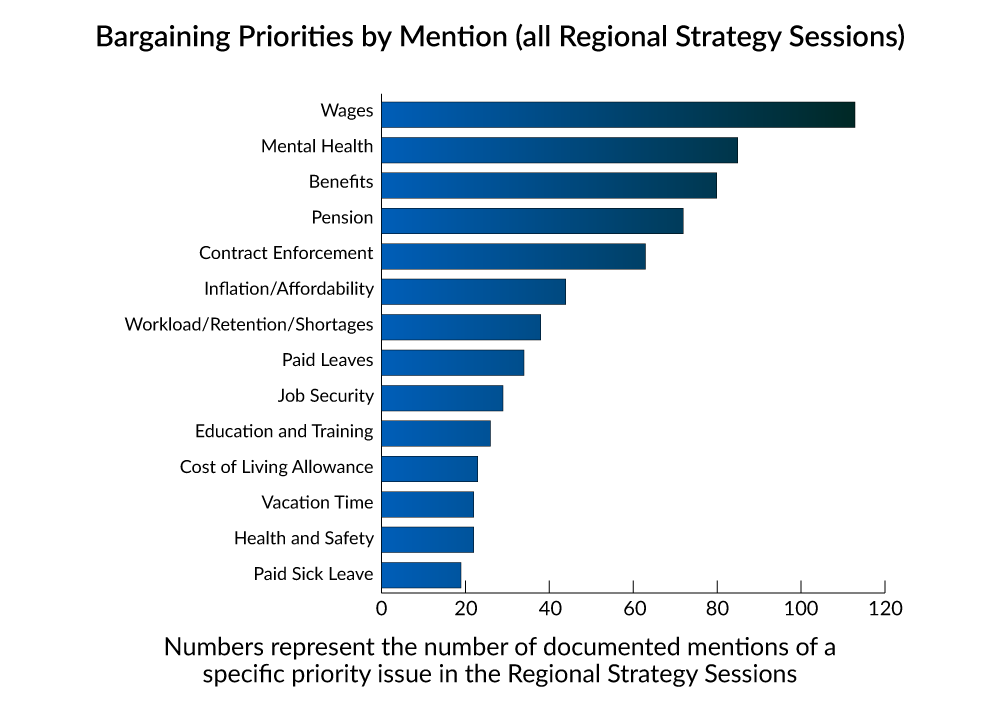
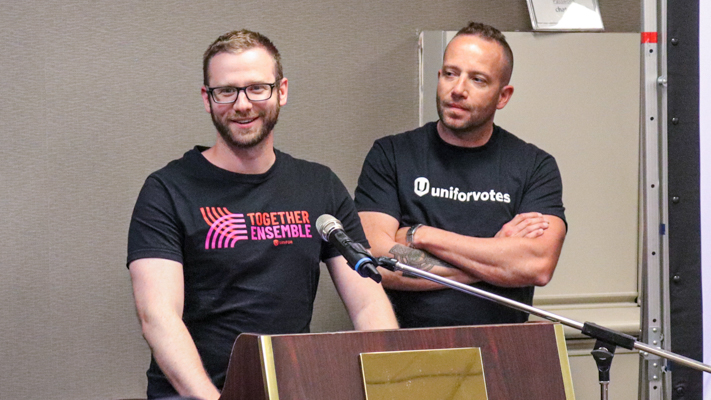
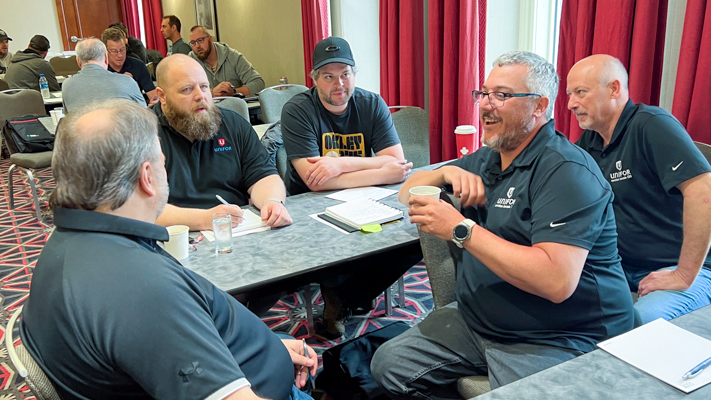
What We Heard: Regional issues and priorities
In your opinion, what issues are priorities for you and your co-workers, and how can they be addressed through bargaining?
Top 5 issues consolidated in each region
Atlantic
-
Wages/inflation
-
Paid leave and sick leave
-
Mental health
-
Benefits
-
Scheduling
West
-
Benefits
-
Wages/inflation
-
Pension
-
Mental health
-
Job security
Quebec
-
Wages/inflation
-
Retirement and pension security
-
Paid leave (family and personal)
-
Worker shortages
-
Scheduling
Ontario
-
Wages/inflation
-
Retirement and pension security
-
Mental health
-
Benefits
-
Job security
What are the challenges and risks you and your co-workers face when trying to address these issues?
Atlantic
-
Lack of education and training
-
Turnover
-
Lacking bargaining power
-
Strike limitations
-
Engaging young workers
West
-
Wages/income insecurity
-
Strike limitations
-
Fear
-
Mental health
-
Engaging young workers
Quebec
-
Lack of education/training
-
Member engagement
-
Engaging young workers
-
Communication
-
Wage/income insecurity
Ontario
-
Wages/income insecurity
-
Pension erosion
-
Mental health
-
Lack of education and training
-
Fear
What are some things the union can do to strengthen its bargaining position with employers by better engaging members?
Atlantic
-
Education and training
-
Enforce contract language
-
Strong wages and benefits
-
Better communication
-
Engaging young workers
West
-
Communication
-
Education and training
-
Strike preparedness
-
Engaging new members
-
Surveys
Quebec
-
Education and training
-
Bargaining workshops
-
Strike preparedness
-
Coordinated or sector bargaining
-
Better communication
Ontario
-
Education and training
-
Better communication
-
Strike preparedness
-
Strong wages and benefits
-
Solidarity and community-building


What We Heard: Equity Standing Committee Meeting
Members from the Regional Equity Standing Committees came together in a special on-line session on June 6, 2023. The event created space for equity deserving representatives to bring forward ideas to inform the union's National Bargaining Program and raise concerns in a setting that prioritized those workplace issues that are often overlooked or not seen as essential.
Five standing committees were represented at this meeting including:
-
Workers with disAbilities,
-
Women,
-
Black, Indigenous and Workers of Colour,
-
Members of the LGBTQ community, and
-
Young Workers.
Participants spoke openly about the challenges faced by equity deserving members in their workplaces and within union structures.
While there is much commonality, in terms of the needs of all workers, the unique identities of equity deserving members can create distinctive experiences of work. Unions and employers need to work harder to understand the challenges and implement solutions and accommodations that reduce barriers.
Members spoke about the need for union representatives, particularly advocates, to have specific training to understand the unique experiences of equity deserving members. Members also spoke about the need for representatives to ensure their needs are met and locals and employers follow through on their obligations.
Participants spoke about the fact that laws in place to reduce barriers and decrease oppression are often ignored or misunderstood. This includes the Federal Employment Equity Act, the duty to accommodate, and the requirement to provide a harassment free environment.
Actions required by law must also be enshrined in collective agreements for added layers of protection and to increase the likelihood of enforcement.
Participants highlighted management as a significant barrier. In the view of participants, management often does not understand what is required of them, is not willing to learn and too frequently fails to deliver on promises. It is not uncommon for management to exploit the different needs of workers to further divide union members and create a hierarchy when determining whose needs will be met.
Local Unions need to ensure safe mechanisms exist to report discrimination. Processes must be robust enough to effectively address toxic workplace and union culture.
Participants noted the need for extra mental health supports for members experiencing discrimination.
Members also spoke about the need to engage members from equity deserving groups consistently and not as an afterthought. Early engagement, well in advance of bargaining, is necessary to ensure needs are understood and are included in the main bargaining proposals.

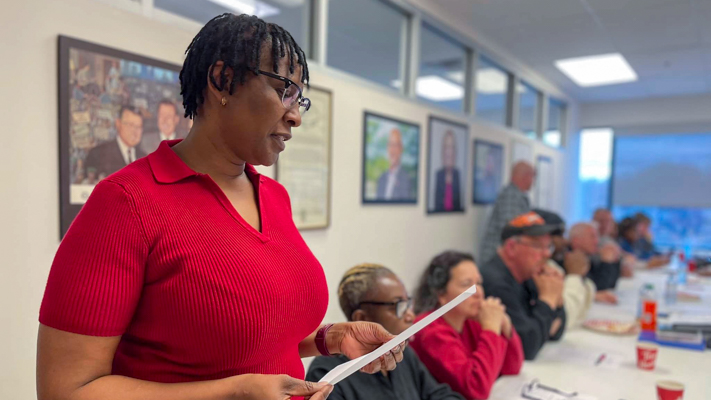
What We Heard: Creative ideas and best practices
Through the Regional Strategy Sessions, members shared creative ideas and best practices to guide the development of the union's National Bargaining Program, including the following:
-
Leave/holiday clauses that provide increased flexibility for workers with families abroad,
-
Pay premiums that recognize worker versatility (ex. mastering of multiple workstations, equipment, etc.)
-
Accessible and flexible early or gradual retirement clauses that focus on mentoring and knowledge transfer,
-
Union-employer joint workplace environment committee focussed on decarbonization issues, crafting of net-zero pathways and create the necessary discussion space on investments,
-
More time and space afforded to the union to welcome new members, provide relevant information and training,
-
Minimum wage “escalator” clauses, ensuring low wages rise in proportion to any legislated minimum wage increase,
-
Pay continuation provisions for apprentices,
-
Accommodations for students to ensure greater school-work balance (e.g. seniority protections, leave allowances),
-
Paid mental health days,
-
Workplace Mental Health Advocates,
-
Accessible contract language (e.g. provided to members in their native language),
-
Cost of living adjustments, to guard against rising inflation,
-
Negotiated, and union-appointed “Benefit Representatives” in the workplaces, dedicated to assist members,
-
Efforts to attract and retain more diversity in the Skilled Trades,
-
Strong language for gender affirming health care,
-
Expand the concept of “family” in contract language and benefit plans beyond heteronormative definitions,
-
Health and safety protections for workers in public-facing workplaces, subject to customer and client abuse,
-
Scope clauses that are broad, cover new subsidiaries and joint ventures under collective agreement terms,
-
Minimum staffing levels to address workload challenges as well as contracting-out,
-
Expand in-home care and assisted living benefits,
-
Equal pay for equal work; end arbitrary pay and benefit disparities for workers doing the same job,
-
Guaranteed minimum hours of work, especially for part-time and casual workers,
-
Financial planning and financial literacy support for members,
-
Strict limits on contract length, across the union,
-
Automatic adjustments to benefit maximums, to keep up with rising costs,
-
Work hour “ownership” provisions, to guard against excessive workloads,
-
Plain language, accessible collective agreements,
-
Four-day work-week concept, for any applicable (and interested) group of workers,
-
Negotiated requirements for representative voices at the bargaining table (union and management),
-
Regular and required labour-management business review meetings, especially around industry and workplace transitions,
-
Parental benefit income top-ups,
-
Mandatory, employer-paid, workplace training and skills development fund,
-
Gender neutral and inclusive language,
-
Anti-harassment and anti-discrimination language embedded in the main body of the agreement, not side letters,
-
Anti-oppression training,
-
Pension plan text included within the collective agreement,
-
Access to information on job studies and time studies that the employer has performed,
-
Prohibitions on misclassifying workers, clear and enforceable distinctions between full time and part time work,
-
Requirements for “career pathing” and opportunities for training and development,
-
Language that enshrines Unifor members' refusal to cross-picket lines, refusal to handle goods made with scab labour,
-
Ensure negotiated benefits apply to all members, regardless of age or job status,
-
Negotiated language that spells out terms and conditions around remote work,
-
Fully eliminate two-tier wages,
-
Language that holds employers accountable for worker access to safe and sanitary washrooms,
-
Pensions and benefits language that is inclusive of trans and non-binary workers,
-
Require union representatives on company environmental or sustainability committees,
-
Strict limitations and penalties on last-minute scheduling changes,
-
Full compensation for all time spent on the job, including prep and travel time,
-
Access to fair and reasonable meal and travel allowances, supporting healthy lifestyles,
-
Ensure benefit continuation over seasonal lay-off periods,
-
Protections and greater control over the employer's use and storage of personal and private information,
-
Paid domestic violence leave,
-
More Advocate positions for equity deserving groups,
-
Neutrality agreements, to ensure workers' rights are upheld in future organizing drives by the same employer,
-
Transferring unused sick days into paid personal days,
-
Mandatory workplace emergency preparedness plans,
-
Mandatory joint training sessions between management representatives and workplace stewards.
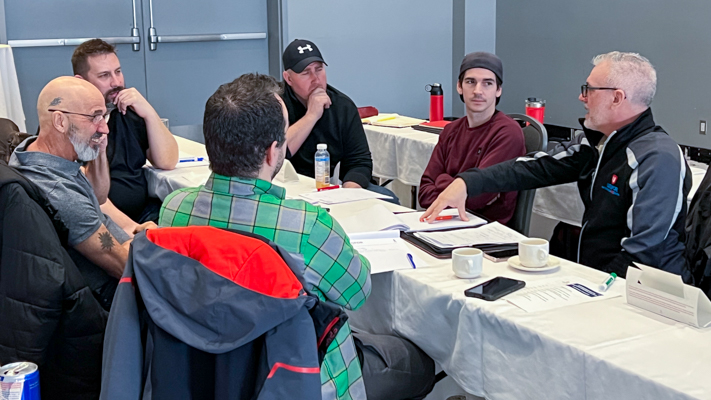
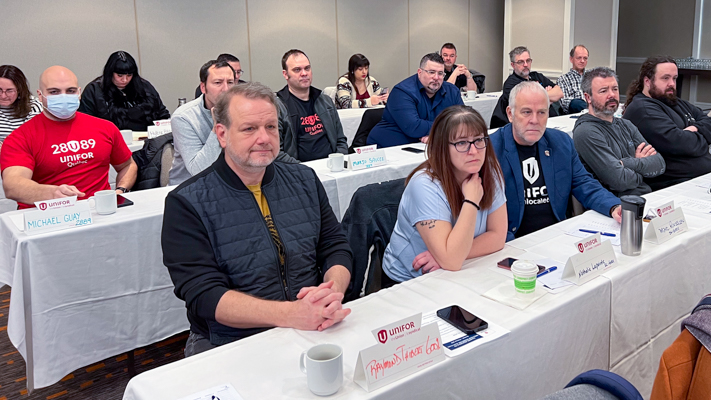
Next Steps
The Bargaining Workers' Power Working Group, having reviewed and approved the key bargaining themes (summarized below), will prepare the final National Bargaining Program report including a series of bargaining recommendations that are reflective of the demands presented by members.
A final report will be presented to delegates and debated at the National Bargaining Workers' Power Summit in Halifax, Nova Scotia on August 17 – prior to the 2023 Unifor Canadian Council.
Summary of Key Bargaining Themes
-
Wages and Income Security (including: pay premiums, pay protection, inflation protection, income top-ups and lay-off assistance, severance, equal pay, etc.)
-
Health and Safety (including: mental health, working alone, emergency preparedness, sickness and accident, joint committees, stress, speed-up, etc.)
-
Benefits (including: Access to benefits, paid holidays, leaves, medical, gender affirming care, etc.)
-
Pensions and Retirement Security (including: advancing pension security, higher benefit levels, indexation, universality, etc.)
-
Human rights, Inclusion, and Workplace Equity (including: equity advocates, Social Justice Fund, employment equity and equity hiring practices, language resources, language training, etc.)
-
New technology, Climate Change, and the Future of Work (including: transition supports, technological awareness, training, investment, work ownership, etc.)
-
Workforce Attraction and Retention (including: work-life balance, working from home, scheduling, hours of work, full-time jobs, etc.)
-
Job Security and Precarious Work (including: scope clauses, skilled trades scopes of practice, organizing, classifications, union security, work ownership, contracting-out, etc.)
-
Union-Building (including: Paid Education Leave, union education, new member orientation, representation, membership data collection, communications, diversity of bargaining committees, coordination of bargaining, etc.


